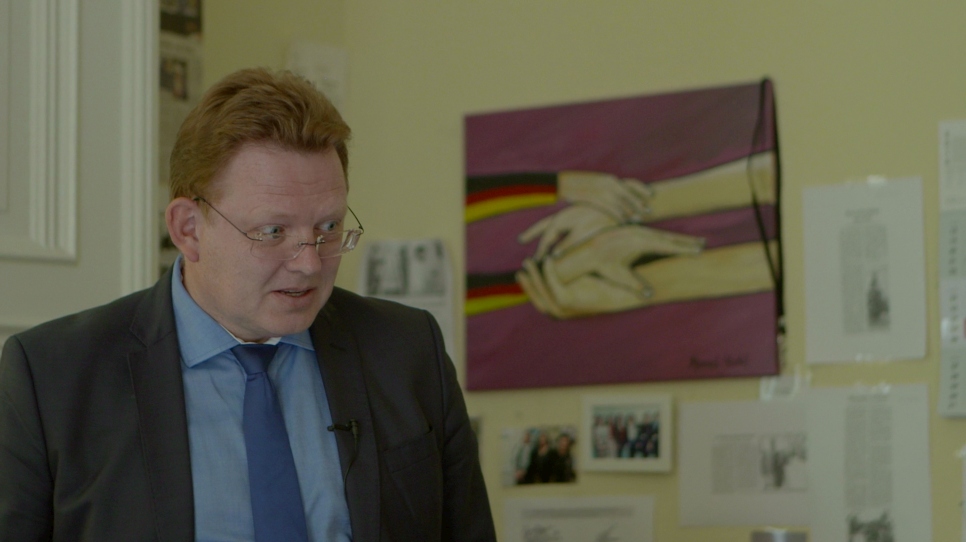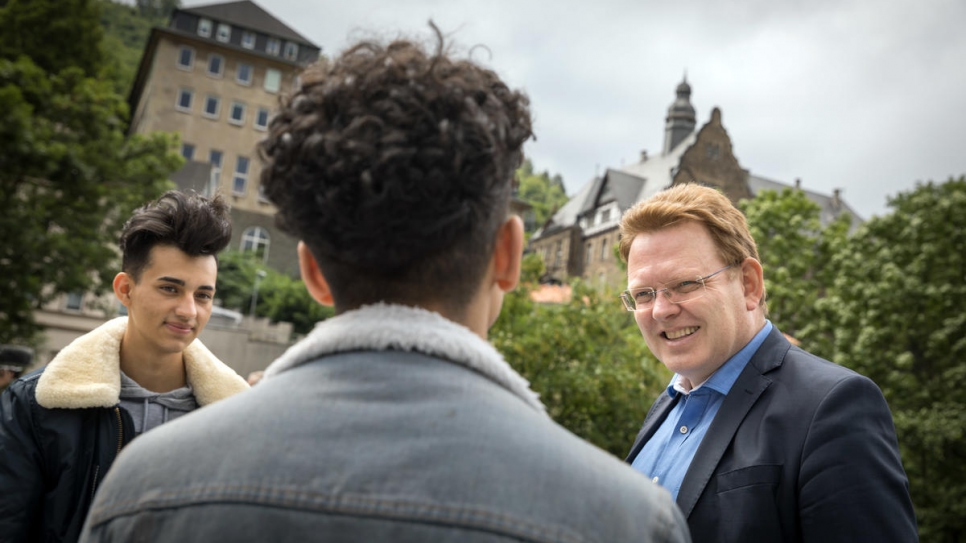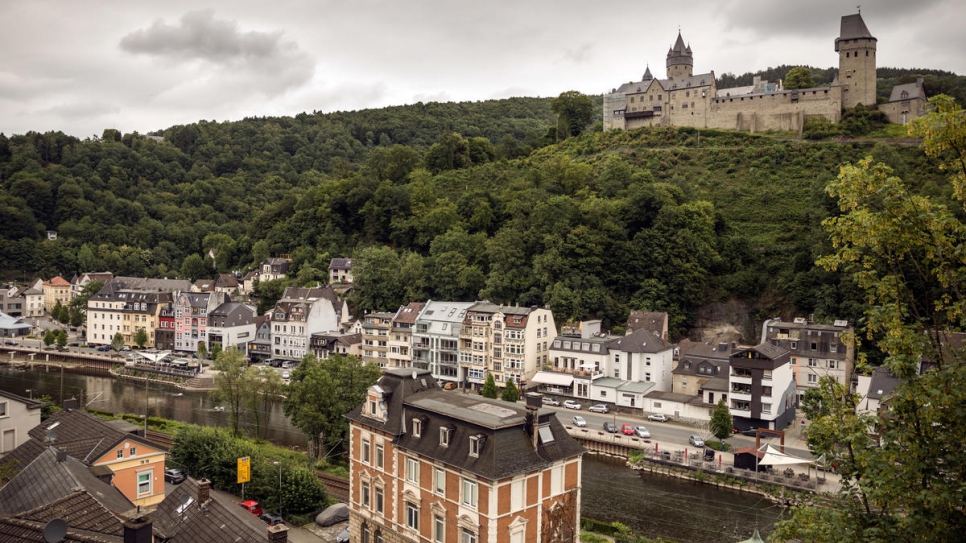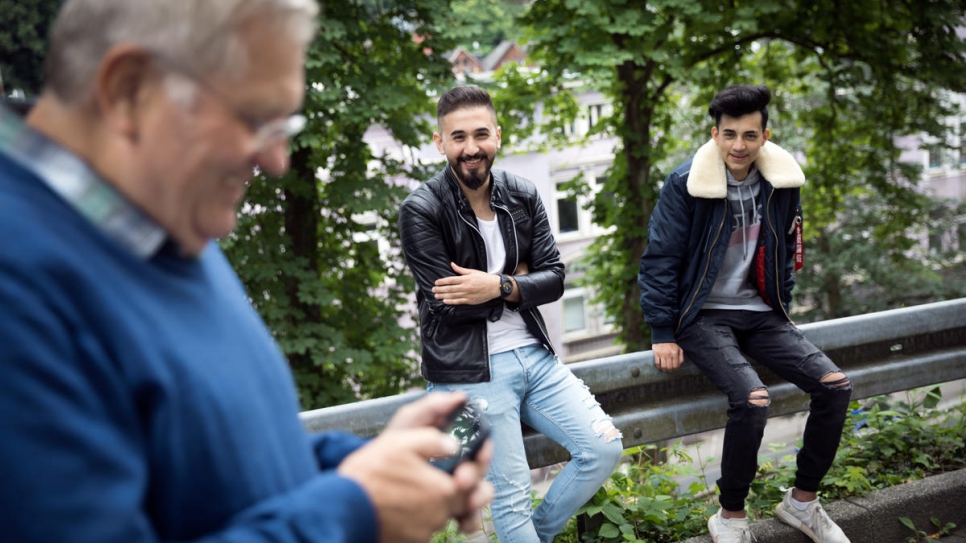German mayor sets example of how to welcome refugees
Andreas Hollstein and his town of Altena are the Europe finalists for UNHCR's annual Nansen Award.

Andreas Hollstein, mayor of Altena, has worked tirelessly to welcome refugees to his town of Altena. © UNHCR/Gordon Welters
Mayor Andreas Hollstein sees refugees as a benefit for his community and when unprecedented numbers arrived in Europe seeking safety, he volunteered to take more than his town’s fair share.
Since then, he has worked tirelessly to make sure the newcomers are welcome in his town of Altena in western Germany and to create an atmosphere conducive to integration, an achievement for which he has been nominated for the UNHCR Nansen Refugee Award.
The annual prize honours those who have gone to extraordinary lengths to support refugees and displaced people.
“It’s about taking small steps and sending out small signals,” says Hollstein, whose town of 17,000 people has accepted 450 asylum-seekers since 2013.
“We can’t solve all the problems of all the millions of refugees in the world,” adds Hollstein, 55. “But we can do our bit to improve things to the best of our ability. I think we’ve done that and it didn’t overwhelm us.”
The town has struggled in recent years. Factories have closed and the population has dwindled. Now the mayor has managed to turn things around, promoting a vision of a community thriving once again, essential to the long-term wellbeing of the refugees and the people hosting them.
He has highlighted the positive effects of the refugee influx, stressing the potential and skills brought individually by the newcomers.
The advantages of improving refugees’ self-reliance and enabling them to have access to the labour market are recognised by the mayor, volunteers and refugees alike. It boosts the local economy and benefits the host population, while providing long-term opportunities for newcomers.
“The goal I’m fighting for is the right one.”
The mayor and his community were previously singled out by the Organization for Economic Co-operation and Development and the German government for their successful approaches to integrating newcomers.
They have now been chosen as the regional finalist for Europe by the Nansen Refugee Award. The as-yet-undisclosed winner of the award will be announced on 25 September and it will be presented by UNHCR, the UN Refugee Agency, at a ceremony in Geneva later this year.
The award is named in honour of Norwegian explorer and humanitarian Fridtjof Nansen, the first High Commissioner for Refugees, who was appointed by the League of Nations in 1921. It aims to showcase his values of perseverance and commitment in the face of adversity.

Andreas Hollstein, Europe region finalist for the 2018 Nansen Refugee Award (Kathryn Porteous, producer / Shi Han Liu, editor / Gordon Welters, videographer)
Hollstein has shown perseverance in the face of the hate mail he has received on a regular basis as well as an injury he suffered in a knife attack last year by a resident believed to be opposed to his policy of welcoming refugees.
“The goal I’m fighting for is the right one,” he says. “I went into politics because I wanted to achieve goals and take stances. That’s not always comfortable, but I still believe it’s right.”
With a dedicated community of volunteers and a range of innovative approaches, Hollstein aims to turn Altena’s newest arrivals from strangers into neighbours. He says improving communication is at the core of his strategy.
“We wanted the new arrivals and locals to talk to each other,” he says. “Even if it has to be using only gestures at first, it’s still better than if people don’t communicate. It means we can turn people from an anonymous number or unknown name and create a relationship with them.”
To encourage this, Hollstein ensures newcomers are housed in apartments in various parts of the town, rather than in a separate, central shelter. When they move in, they are introduced to their new neighbours by volunteers.
“The newcomers are a gain for German society.”
The administration supported the development of an internet portal to match refugees’ skills with jobs.
This approach has enabled many quickly to establish contacts with members of the local population, learn the language and find employment or education opportunities.
For Zarifa Brmaja, a mother of two from the Syrian city of Aleppo, the policy has proved a lifeline. Nearly every day, she has a visit from an elderly neighbour who is helping her learn German.
“It’s good here in Altena because people want to help,” says Zarifa, 25, who is also enrolled in a volunteer-run language course at Stellwerk, a coordination centre for volunteers. While she studies, volunteers look after her two young children in a room next door.
“The people here are very welcoming,” agrees Zarifa’s husband, Shahin, 33, an engineer who found work with Altena’s municipal utility after also completing German classes. “Maybe in other places there’s not so much contact between people. But we know that we’re lucky here.”
Altena’s welcome strategy goes beyond chance friendships with neighbours. Hollstein wanted to make sure that all newcomers had someone to look out for them.
Volunteers act as so-called “carers” to help asylum-seekers deal with officialdom and support them in other aspects of daily life in Germany.
“The newcomers are a gain for German society,” says Ludger Leweke, 68, a life-long Altena resident and volunteer who mentors about 20 young refugees, helping them apply for work and traineeships. “That’s why I want to help them into careers.”
“With small steps you can do something good for people in need.”
One of them is Muhannad Alsaour, 23, from Damascus, who arrived in Altena in 2015. He quickly learned German and has secured a traineeship as an electrician.
“Ludger explained to me how to have a good life here in Germany,” he says. “I’m very thankful to him. He’s helped me a lot.”
Stories like Muhannad’s and Ludger’s can be found all over town and, according to Hollstein, are the secret behind Altena’s success.
“Volunteers are the backbone of our work – nothing would happen without them,” he says. “What’s special in Altena is the comprehensive approach. We aren’t doing anything that isn’t happening elsewhere, but we’re doing things to a high standard in a number of different directions.”
He hopes Altena’s success will send a strong message to other communities that even the smallest contributions can make a difference, whatever their size, in Germany and beyond.
“With small steps you can do something good for people in need,” says Hollstein. “It’s not the big words of top politicians that are important. It’s the people out there showing the humanitarian face of Europe – and that’s us.”
Rights campaigner fights for Thailand’s stateless people
Nansen Award finalist gives girls in Jordan a sporting chance




